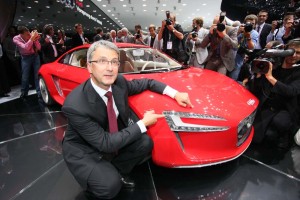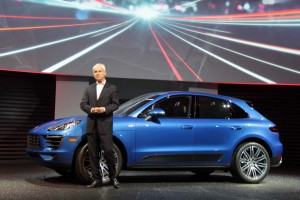
Rupert Stadler, shown with an etron concept, reportedly will head the new group pairing Audi, Lamborghini and Ducati.
Already wracked by turmoil in its executive suite, the Volkswagen Group is about to shake up its corporate structure. A new, decentralized approach reportedly will split VW’s 12 different brands into four holding companies.
The approach appears to be modeled after the approach VW has taken with luxury brand Audi, which has long operated as a semi-autonomous group. The Lamborghini and Ducati brands were directly owned by Audi, and the trio will continue to be run by Audi CEO Rupert Stadler.
The approach appears to be a significant shift in direction from the centrally controlled management structure put in place by Ferdinand Piech, the Volkswagen chairman who was ousted earlier this year in a split with the VW management board. The new structure is aimed at streamlining operations and speeding up Volkswagen’s ability to respond to the marketplace.
During his years as CEO and then chairman, Piech took an extremely heavy-handed micro-management approach. That led to a falling out when he tried to scuttle the career of his one-time protégé, current VW CEO Martin Winterkorn, who was expected to become the maker’s next chairman.
The flagship Volkswagen division will be grouped together with the mainstream Seat and Skoda brands, that holding company headed by former BMW executive Herbert Diess.
Porsche and Bentley, which have already been working together on several up-market projects, such as the upcoming Bentley Bentayga SUV, will be paired in another group. They will be joined by the ultra-exclusive Bugatti, and run by current Porsche boss Matthias Mueller.
The remaining brands will be part of a holding company focused on trucks and commercial vehicles. They include Scania, MAN, and Volkswagen Commercial. Andreas Renschler, a long-time Daimler AG executive, will head this unit.
(VW enjoying strong sales results in 2015. For more, Click Here.)
The final details of the plan, apparently, have yet to be worked out. Among other things, reports from Europe suggest that VW management is still debating whether to set up separate group-level managers for sales and production, as well as to oversee the booming Chinese market where VW is the leading automotive manufacturer.
The German business daily Handelsblatt was first to report the planned restructuring. TheDetroitBureau.com has not yet received a response from Volkswagen headquarters.
(Click Here for details about TDB’s first look at the 2016 Volkswagen GLI.)
There was a growing push for Volkswagen to change its strategy even before the internal fight that led to Piech’s departure. While the maker’s first-quarter earnings rose 19%, to $3.23 billion, its margins have been short of what analysts and investors have been calling for. Despite cost-cutting described by the German maker as “in the low triple-digits millions,” VW has been seen as having much too bloated a cost structure. It has also been faulted for being slow to respond to changing market trends.
The company was late to market with hybrids, for example, though it is now making a major push into plug-based technologies, such as the plug-in hybrid version of the Golf hatchback, and a performance-based PHEV alternative that will be offered for the upcoming Bentley Bentayga.
(To see more about VW’s plans to expand its U.S. plant and add nearly 10,000 jobs, Click Here.)
The planned restructuring is generating positive feedback. “VW has in the past often responded slowly to market parameters which are changing quickly,” said Marc-Rene Tonn, an automotive analyst with M.M. Warburg. “Realigning brands in that way makes good sense. It would clarify responsibilities and speed up decision-making.”


I’m not so sure reorganizing for the sake of reorganizing is beneficial. There are positives and negatives associated with centralized management. Piech’s quest to be the biggest auto maker by volume was not necessarily a good business strategy. The revised structure may or may not be any better. Only time will tell. Since there is no mention of Klingler the VW board member responsible for VW sales, perhaps he’s a scapegoat in this deal?
The reason VW was late to the hybrid market is because clean Diesels are a better alternative and VW has proven this many times. Unfortunately the Obama administration and the EPA have done all that they can to prevent the sale of clean Diesels in the U.S. In fact their pulled-from-their-orifice 54.5 mpg CAFE requirement is the only reason why auto makers are even considering selling impractical EVs because the technology does not exist to meet the 54.5 mpg, CAFE mandate. So once again we have bad government forcing impractical, expensive, unrealistic technology down consumer’s throats. It’s down right disgraceful just like the gasohol scam.
At least one southern State has done its part, by cancelling the EV tax credit entirely, and boosting the annual tag registration fee for any EV to ten times (10X) the fee the conventionally fueled car would be.
If that don’t get them thar lily-livered liberals back in a pickup as God intended, don’t know what will.
It’s just wrong to subsidize a nefarious EV program but politicians are looking to get reelected not necessarily looking to improve society. We have enough issues with people looking for a free lunch without adding to the problem with undeserved financial incentives to EV consumers or charlatans looking to build a factory on tax payer dollars.